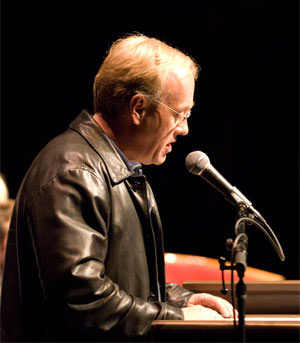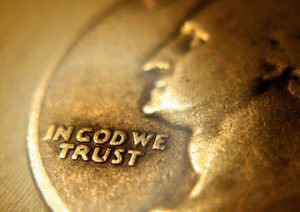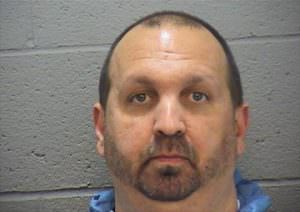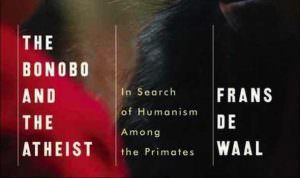Chris Hedges: I Don’t Believe in Atheists
On Tuesday night, Chris Hedges and Sam Harris debated "Religion, Politics and the End of the World" The following is Hedges' opening statement, in which he argues that Harris and other critics of faith have mistakenly blamed religion for the ills of the world, when the true danger lies in the human heart and its capacity for evil.
Editor’s Note: On Tuesday night, Chris Hedges and Sam Harris debated “Religion, Politics and the End of the World.” The following is Hedges’ opening statement, in which he argues that Harris and other critics of faith have mistakenly blamed religion for the ills of the world, when the true danger lies in the human heart and its capacity for evil. Click here for full debate coverage.
Sam Harris has conflated faith with tribalism. His book is an attack not on faith but on a system of being and believing that is dangerous and incompatible with the open society. He attacks superstition, a belief in magic and the childish notion of an anthropomorphic God that is characteristic of the tribe, of the closed society. He calls this religion. I do not.
What he fails to grasp is not simply the meaning of faith — something I will address later — but the supreme importance of the monotheistic traditions in creating the concept of the individual. This individualism — the belief that we can exist as distinct beings from the tribe, or the crowd, and that we are called on as individuals to make moral decisions that at times defy the clamor of the tribe or the nation — is a gift of the Abrahamic faiths. This sense of individual responsibility is coupled with the constant injunctions in Islam, Judaism and Christianity for a deep altruism. And this laid the foundations for the open society. This individualism is the central doctrine and most important contribution of monotheism. We are enjoined, after all, to love our neighbor, not our tribe. This empowerment of individual conscience is the starting point of the great ethical systems of our civilization. The prophets — and here I would include Jesus — helped institutionalize dissent and criticism. They initiated the separation of powers. They reminded us that culture and society were not the sole prerogative of the powerful, that freedom and indeed the religious life required us to often oppose and defy those in authority. This is a distinctly anti-tribal outlook. Immanuel Kant built his ethics upon this radical individualism. And Kant’s injunction to “always recognize that human individuals are ends, and do not use them as mere means” runs in a direct line from the Christian Gospels. Karl Popper rightly pointed out in the first volume of “The Open Society and Its Enemies,” when he writes about this creation of the individual as set against the crowd, that “There is no other thought which has been so powerful in the moral development of man” (P. 102, Vol. 1). These religions set free the critical powers of humankind. They broke with the older Greek and Roman traditions that gods and destiny ruled human fate — a belief that when challenged by Socrates saw him condemned to death. They offered up the possibility that human beings, although limited by circumstances and simple human weaknesses, could shape and give direction to society. And most important, individuals could give direction to their own lives.
Human communication directly shapes the quality of a culture. These believers were being asked to embrace an abstract, universal deity. This deity could not be captured in pictures, statues or any concrete, iconographic form. God exists in the word and through the word, an unprecedented conception in the ancient world that required the highest order of abstract thinking. “In the beginning,” the Gospel of John reads, “was the Word, and the Word was with God, and the Word was God.” This is why the second of the Ten Commandments prohibits Israelites from making concrete images of God. “Iconography thus became blasphemy,” Neil Postman writes, “so that a new kind of God could enter a culture.”
God is a human concept. God is the name we give to our belief that life has meaning, one that transcends the world’s chaos, randomness and cruelty. To argue about whether God exists or does not exist is futile. The question is not whether God exists. The question is whether we concern ourselves with, or are utterly indifferent to, the sanctity and ultimate transcendence of human existence. God is that mysterious force — and you can give it many names as other religions do — which works upon us and through us to seek and achieve truth, beauty and goodness. God is perhaps best understood as our ultimate concern, that in which we should place our highest hopes, confidence and trust. In Exodus God says, by way of identification, “I am that I am.” It is probably more accurately translated: “I will be what I will be.” God is better understood as verb rather than a noun. God is not an asserted existence but a process accomplishing itself. And God is inescapable. It is the life force that sustains, transforms and defines all existence. The name of God is laden, thanks to our religious institutions and the numerous tyrants, charlatans and demagogues these institutions produced, with so much baggage and imagery that it is hard for us to see the intent behind the concept. All societies and cultures have struggled to give words to describe these forces. It is why Freud avoided writing about the phenomenon of love.
Faith allows us to trust, rather, in human compassion, even in a cruel and morally neutral universe. This is not faith in magic, not faith in church doctrine or church hierarchy, but faith in simple human kindness. It is only by holding on to the sanctity of each individual, each human life, only by placing our faith in the tiny, insignificant acts of compassion and kindness, that we survive as a community and as a human being. And these small acts of kindness are deeply feared and subversive to institutional religious and political authorities. The Russian novelist Vasily Grossman wrote in “Life and Fate”:
I have seen that it is not man who is impotent in the struggle against evil, but the power of evil that is impotent in the struggle against man. The powerlessness of kindness, of senseless kindness, is the secret of its immortality. It can never be conquered. The more stupid, the more senseless, the more helpless it may seem, the vaster it is. Evil is impotent before it. The prophets, religious teachers, reformers, social and political leaders are impotent before it. This dumb, blind love is man’s meaning.
Human history is not the battle of good struggling to overcome evil. It is a battle fought by a great evil struggling to crush a small kernel of human kindness. But if what is human in human beings has not been destroyed even now, then evil will never conquer.
It is by the seriousness of our commitments to compassion, indeed our ability to sacrifice for the other, especially for the outcast and the stranger, our commitment to justice — the very core of the message of the prophets and the teachings of Jesus — that we alone can measure the quality of faith. This is the meaning of true faith. As Matthew wrote. “By their fruits shall you know them.” Professed faith — what we say we believe — is not faith. It is an expression of loyalty to a community, to our tribe. Faith is what we do. This is real faith. Faith is the sister of justice. And the prophets reminded us that nothing is exempt from criticism. Revelation is continuous. It points beyond itself. And doubt, as well as a request for forgiveness, must be included in every act of faith, for we can never know or understand the will of God.
The problem is not religion but religious orthodoxy. Most moral thinkers — from Socrates to Christ to Francis of Assisi — eschewed the written word because they knew, I suspect, that once things were written down they became, in the wrong hands, codified and used not to promote morality but conformity, subservience and repression. Writing freezes speech. George Steiner calls this “the decay into writing.” Language is turned from a living and fluid form of moral inquiry to a tool of bondage.
The moment the writers of the Gospels set down the words of Jesus they began to kill the message. There is no room for prophets within religious institutions — indeed within any institutions — for as Paul Tillich knew, all human institutions, including the church, are inherently demonic. Tribal societies persecute and silence prophets. Open societies tolerate them at their fringes, and our prophets today come not from the church but from our artists, poets and writers who follow their inner authority. Samuel Beckett’s voice is one of modernity’s most authentically religious. Beckett, like the author of Ecclesiastes, was a realist. He saw the pathetic, empty monuments we spend a lifetime building to ourselves. He knew, as we read in Ecclesiastes, that nothing is certain or permanent, real or unreal, and that the secret of wisdom is detachment without withdrawal, that, since death awaits us all, all is vanity, that we must give up on the childish notion that one is rewarded for virtue or wisdom. In Ecclesiastes God has put ‘olam into man’s mind. ‘Olam usually means eternity, but it also means the sense of mystery or obscurity. We do not know what this mystery means. It teases us, as Keats wrote, out of thought. And once we recognize it and face it, simplistic answers no longer work. We are all born lost. Our vain belief in our own powers, in our reason, blinds us.
Those who silenced Jesus represented all human societies, not the Romans or the Jews. When Jesus attacks the chief priests, scribes, lawyers, Pharisees, Sadducees and other “blind guides” he is attacking forms of oppression as endemic to Christianity, as to all religions and all ideologies. If civil or religious authority enforces an iron and self-righteous conformity among members of a community, then faith loses its uncertainty, and the element of risk is removed from acts of faith. Faith is then transformed into ideology. Those who deform faith into creeds, who use it as a litmus test for institutional fidelity, root religion in a profane rather than a sacred context. They seek, like all who worship idols, to give the world a unity and coherency it does not possess. They ossify the message. And once ossified it can never reach an existential level, can never rise to ethical freedom — to faith. The more vast the gap between professed faith and acts of faith, the more vast our delusions about our own grandeur and importance, the more intolerant, aggressive and dangerous we become.
Faith is not in conflict with reason. Faith does not conflict with scientific truth, unless faith claims to express a scientific truth. Faith can neither be affirmed nor denied by scientific, historical or philosophical truth. Sam confuses the irrational — which he sees as part of faith — with the non-rational. There is a reality that is not a product of rational deduction. It is not accounted for by strict rational discourse. There is a spiritual dimension to human existence and the universe, but this is not irrational — it is non-rational. Faith allows us to transcend what Flaubert said was our “mania for conclusions,” a mania he described as “one of humanity’s most useless and sterile drives.”
Reason allows us to worship at the idol of our intrinsic moral superiority. It is a dangerous form of idolatry, a form of faith, certainly, but one the biblical writers knew led to evil and eventually self-immolation.
“We are at war with Islam,” Harris writes. “It may not serve our immediate foreign policy objectives for our political leaders to openly acknowledge this fact, but it is unambiguously so. It is not merely that we are at war with an otherwise peaceful religion that has been ‘hijacked’ by extremists. We are at war with precisely the vision of life that is prescribed to all Muslims in the Koran, and further elaborated in the literature of the hadith, which recounts the sayings and teachings of the Prophet” (P. 110).
He assures us that “the Koran mandates such hatred” (P. 31 ), that “the problem is with Islam itself” (P. 28). He writes that “Islam, more than any other religion human beings have devised, has all the makings of a thoroughgoing cult of death” (P. 123).
Now after studying 600 hours of Arabic, spending seven years of my life in the Middle East, most of that time as the Middle East bureau chief for The New York Times, I do not claim to be a scholar on Islam. But I do know the Koran is emphatic about the rights of other religions to practice their own beliefs and unequivocally condemns attacks on civilians as a violation of Islam. The Koran states that suicide, of any type, is an abomination. More important, the tactic of suicide bombing was pioneered as a weapon of choice by the Tamils, who are chiefly Hindu, in Sri Lanka long before it was adopted by Hezbollah, al-Qaida or Hamas. It is what you do when you do not have artillery or planes or missiles and you want to create maximum terror.I also know from my time in the Muslim world that the vast majority of the some 1 billion Muslims on this planet — most of whom are not Arab — are moderate, detest the violence done in the name of their religion and look at the Pat Robertsons and Franklin Grahams, who demonize Muslims in the name of Christianity, with the same horror with which we look at Osama bin Laden or Hamas. The Palestinian resistance movement took on a radical Islam coloring in the 1990s only when conditions in Gaza and the West Bank deteriorated and thrust people into profound hopelessness, despair and poverty — conditions similar to those that empowered the Christian right in our own country. Before that the movement was decidedly secular. I know that Muslim societies are shaped far more by national characteristics — an Iraqi has a culture and outlook on life that are quite different from an Indonesian’s — just as a French citizen, although a Catholic, is influenced far more by the traits of his culture. Islam has within it tiny, marginal groups that worship death, but nearly all suicide bombers come from one language group within the Muslim world, Arabic, which represents only 20 percent of Muslims. I have seen the bodies — including the bodies of children — left in the wake of a suicide bombing attack in Jerusalem. But I have also seen the frail, thin bodies of boys shot to death for sport by Israeli soldiers in the Gaza Strip. Tell me the moral difference. I fail to see one, especially as a father.
Finally, let us not forget that the worst genocides and slaughters of the last century were perpetrated not by Muslims but Christians. To someone who lived in Sarajevo during the Serbian siege of the city, Sam’s demonization of the Muslim world seems odd. It was the Muslim-led government in Bosnia that practiced tolerance. There were some 10,000 Serbs who remained in the city and fought alongside the Bosnia Muslims during the war. The city’s Jewish community, dating back to 1492, was also loyal to the government. And the worst atrocities of the war were blessed not by imams but Catholic and Serbian Orthodox priests. Sam’s argument that atheists have a higher moral code is as specious as his attacks on Islam. Does he forget Joseph Stalin, Adolf Hitler and Pol Pot? These three alone filled the earth with more corpses in the last century than all of the world’s clerics combined.
The danger is not Islam or Christianity or any other religion. It is the human heart — the capacity we all have for evil. All human institutions with a lust for power give their utopian visions divine sanction, whether this comes through the worship of God, destiny, historical inevitability, the master race, a worker’s paradise, fraternite-egalite-liberte or the second coming of Jesus Christ.
Religion is often a convenient vehicle for this blood lust. Religious institutions often sanctify genocide, but this says more about us, about the nature of human institutions and the darkest human yearnings, than it does about religion. This is the greatest failing of Sam’s book. He externalizes evil. And when you externalize evil, all tools, including violence and torture, become legitimate to eradicate an evil that is outside of you. This worldview — one also adopted by the Christian right — is dangerous, for if we fail to acknowledge our own capacity for evil it will grow unchecked and unheeded. It is, in essence, the call to live the unexamined life.
This externalization of evil is what allows Sam to endorse torture. He, of course, deludes himself into believing that it is reason that requires us to waterboard detainees in the physical and moral black holes we have set up to make them disappear. He quotes Alan Dershowitz, not only to reassure us that the Israelis treat Palestinians — 400 of whom they have killed in Gaza over the past few months — humanely, but to trot out the absurd notion of a ticking time bomb, the idea that we know a terrorist has planted a large bomb in the center of the city and we must torture him, or in the glib phrase of Harris, we must dust off “a strappado” and expose “this unpleasant fellow to a suasion of bygone times” (P. 193).
I guess this reference to torture is amusing if you have spent your life encased in the protected world of the university. As someone who was captured and held for over a week by the Iraqi Republican Guard during the 1991 Shiite uprising in Basra and then turned over for my final 24 hours to the Iraqi secret police — who my captors openly expected to execute me — I find this glib talk of physical abuse repugnant. Dershowitz and Harris cannot give us a legal or historical precedent where such a case as they describe actually happened. But this is not the point; the point is to endow themselves with the moral right to abuse others in the name of their particular version of goodness. This is done in the name of reason. It is done in the name of a false god, an idol. And this god — if you want it named — is the god of death, or as Freud stated, Thanatos, the death instinct, the impulse that works toward the annihilation of all living things, including ourselves. For once you torture, done in the name of reason, done to make us safe, you unleash sadists and killers. You consign some human beings to moral oblivion. You become no better than those you oppose.
The danger of Sam’s simplistic worldview is that it does what fundamentalists do: It creates the illusion of a binary world of us and them, of reason versus irrationality, of the forces of light battling the forces of darkness. And once you set up this world you are permitted to view as justified military intervention, brutal occupation and even torture, anything, in short, that will subdue what is defined as irrational and dangerous. All this is done in the name of reason, in the name of his god, which looks, like all idols, an awful lot like Sam Harris.
“Necessity,” William Pitt wrote, “is the plea for every infringement of human freedom.”
Sam ends his book with a chapter that can best be described as Buddhism light. His spirituality, which apparently includes life after death and telepathy, fuels our narcissistic obsession with our individual unconscious. I am not against solitude or meditation, but I support it only when it feeds the moral life rather than serves as an excuse to avoid moral commitment. The quest for personal fulfillment can become an excuse for the individual to negate his or her responsibilities as a citizen, as a member of a wider community. Sam’s religion — for Sam in an odd way tries at the end of his book to create one — is in tune with this narcissism. His idealized version of Buddhism is part of his inability to see that it too has been used to feed the lusts of warriors and killers, it too has been hijacked in the name of radical evil. Buddhist Shinto warrior cults justified and absolved those who carried out the worst atrocities committed by the Japanese in Nanjing. By the end of World War II Buddhist and Shinto priests recruited and indoctrinated kamikaze (divine wind) pilots in the name of another god. It is an old story. It is not the evil of religion, but the inherent capacity for evil of humankind.
The point of religion, authentic religion, is that it is not, in the end, about us. It is about the other, about the stranger lying beaten and robbed on the side of the road, about the poor, the outcasts, the marginalized, the sick, the destitute, about those who are being abused and beaten in cells in Guantanamo and a host of other secret locations, about what we do to gays and lesbians in this country, what we do to the 47 million Americans without health insurance, the illegal immigrants who live among us without rights or protection, their suffering as invisible as the suffering of the mentally ill we have relegated to heating grates or prison cells. It is about them.
We have forgotten who we were meant to be, who we were created to be, because we have forgotten that we find God not in ourselves, finally, but in our care for our neighbor, in the stranger, including those outside the nation and the faith. The religious life is not designed to make you happy, or safe or content; it is not designed to make you whole or complete, to free you from anxieties and fear; it is designed to save you from yourself, to make possible human community, to lead you to understand that the greatest force in life is not power or reason but love.
As Reinhold Niebuhr wrote:
Dig, Root, GrowNothing worth doing is completed in our lifetime, Therefore, we are saved by hope. Nothing true or beautiful or good makes complete sense in any immediate context of history; Therefore, we are saved by faith. Nothing we do, however virtuous, can be accomplished alone. Therefore, we are saved by love. No virtuous act is quite as virtuous from the standpoint of our friend or foe as from our own; Therefore, we are saved by the final form of love which is forgiveness.
This year, we’re all on shaky ground, and the need for independent journalism has never been greater. A new administration is openly attacking free press — and the stakes couldn’t be higher.
Your support is more than a donation. It helps us dig deeper into hidden truths, root out corruption and misinformation, and grow an informed, resilient community.
Independent journalism like Truthdig doesn't just report the news — it helps cultivate a better future.
Your tax-deductible gift powers fearless reporting and uncompromising analysis. Together, we can protect democracy and expose the stories that must be told.
This spring, stand with our journalists.
Dig. Root. Grow. Cultivate a better future.
Donate today.







You need to be a supporter to comment.
There are currently no responses to this article.
Be the first to respond.